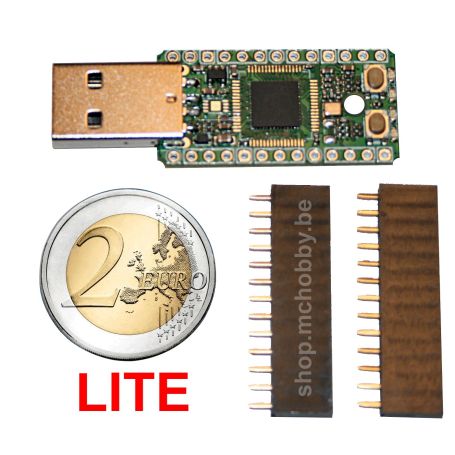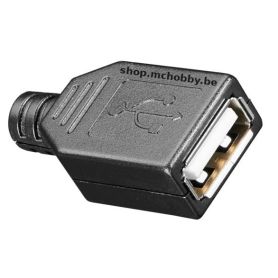PYBStick Lite 26 - MicroPython and Arduino - F401CE
PYBStick Lite 26, LITE-F401CEU
- MicroPython and Arduino Ready
- 26 pins
- STM32F401CE @ 84 MHz
- 512 Ko Flash
- 96 Ko RAM
- USB not soldered
- No microCard connector
Payments are secured by LyraCollect, a French payment collection company.
It is possible to delivered to your home, to a pick-up point or picked up by appointment at MCHobby
We prepare, pack and ship your orders with great respect and care.
1 item per order please.
This product is not yet produced in large quantity. Please think to the other makers.
PYBStick Lite: a very affordable MicroPython / Arduino compatible board to propel all your projects
The PYBStick card is a joint project of Garatronic and MCHobby. We wanted to make a MicroPython board sufficiently affordable, practical and well documented in French to be able to be included in all projects without having to worry about the price. We did it, it is the PYBStick in Lite and standard version. The platform includes a powerful STM32, which allows to have a powerful platform supporting both Arduino IDE and MicroPython ... what more? The Program magazine! It is joined to our adventure to make PYBStick accessible to as many people as possible.
Here the PYBStick Lite 26 is powered by an STM32F401CE, a powerful microcontroller with 512 KB of Flash memory and 96 KB of RAM. This very economical platform is capable of running projects in MicroPython and Arduino IDE (it is the same MCU as the Pyboard Lite).
At less than 10 Eur, it is a feat which you will have to join to weld the connectors and the USB plug (this should take a few minutes).
The PYBStick Lite 26 (LITE-F401CEU) offers a 26-pin interface (compatible with the Standard and Pro version):
- 17 GPIO
- 6 analog inputs (ADC)
- 15 PWM outputs
- 2 serial port (UART)
- 2 I2C bus
- 1 SPI bus
The PYBStick board is available in 4 versions PYBStick Lite (this product), PYBStick Standard, PYBStick Pro and PYBStick Duino (arduino only).
On the MicroPython side, the board can be equipped with the USB connector (Type A, to be welded) allowing direct connection of the board to a computer to be programmed. Under MicroPython, the memory of the board is presented as a Flash reader allowing direct editing of Python scripts on the PYBStick. The USB interface also allows the PYBStick to expose a serial port on the computer as well as an interactive Python command interpreter called REPL.
The REPL command interpreter allows:
- To see the messages displayed by MicroPython,
- Interact with your scripts during operation (stop the script, inspect the state of variables)
- Test scripts under development (import on the fly with the import command).
- Enter Python instructions to test the microcontroller platform interactively.
On the Arduino IDE side, simply connect the platform to your computer, place it in programming mode and then start the compilation and upload of your Arduino sketch. Garatronic has provided instructions for installing the Arduino IDE support for the PYBStick.
Inexpensive and multi-use
The PYBStick Lite is designed around several key points.
- Oriented towards Makers
- Oriented towards learning and school
- Be super affordable with an unbeatable price ratio
The price is low enough not to have to think before including the PYBStick in a project or another.
On this version The USB connector is not welded to compress the price of the board (but it remains quite easy to place). Not having this USB plug welded is also an advantage because the PYBStick Lite has a minimum obstruction (28x35.5mm) the board can be placed absolutely anywhere!
For learning, just weld the connector (or move it to a case).
GPIO connectors have a standard impaction of 2.54mm. This will delight all makers, teachers because it is easy to place the board on a breadboard or a Perfboard.
User interface included
The board provides three colored LEDs as well as a user button and a DFU button (to update the MicroPython/Arduino firmware). Their use is documented in the online documentation.
Also for professionals
The space between the two rows of connectors corresponds to the DIL dimension of the old EEPROMs. So, you can develop your own boards by providing an already standardized connector. It only remains to connect your PYBStick to it.
The USB Type-A connector is not welded, which gives you the opportunity to opt for another connector (microUSB), a connection cable, a remote connector, no USB for a very compact solution.
Why a USB Type-A?
It is true that it seems strange but there are several good reasons for this.
- Powerbanks have standard USB. So the project can easily be powered by plugging it into a PowerBank.
- USB A allows direct use of the PYBStick as a USB mass storage device, HID device (keyboard, mouse) or serial device (virtual serial port).
Just put it on the PC or a USB HUB and let's go.
There is a copy/paste example in the book "MicroPython and Pyboard" which can be applied directly to the PYBStick. - The USB-A is mechanically very robust, ideal for education/learning where the first manipulations are sometimes rougher.
- Because it will not be directly soldered on the PYBStick thus leaving the choice of the desired connector for confirmed makers.
Content
For each order, you will receive the PybStick board, a row of connectors and the USB type A connector are included with the board. You can solder the female connectors and the USB connector on the board according to your needs.
Technical details
- Dimensions: 28x35mm (without USB), 28x50.5mm (with USB)
- Thickness: 4.5mm (without USB), 6mm (with USB)
- 3.3V 300mA regulator
- 350mA max, 580mA over-current shutdown
- VIN max 18v
- ME6215C33 datasheet (voltage regulator)
- STM21F401CE datasheet (microcontroller)
- Firmware MicroPython v1.20 for PYBStick F401
Tutorial
The PYBStick board has MicroPython tutorials on the Wiki of MCHobby. All the knowledge available on the Net around MicroPython also applies to this product.
- PYBStick GitHub (MCHobby, English et French)
Pinouts, libraries, ressources - Projects with PYBStick under MicroPython (MCHobby GitHub, French)
- Wiki of the PYBStick under Arduino (Garatronic, French)
- Wiki of the PYBStick under MicroPython (MCHobby Wiki, French)
A set of tutorials to discover electronics under MicroPython with the PYBStick. - 3D PYBStick case (Thingiverse)
To print yourself.











